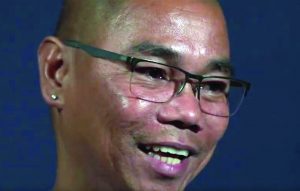Migrante Canada head eligible for permanent residence status
Migrante Canada head eligible for permanent residence status

Danilo de Leon
Deportation order rescinded
By Nestor Burgos
The Philippine Reporter
VANCOUVER—Tears of joy capped the more than year-long battle of a Filipino migrants rights leader who had been facing deportation to the Philippines.
“I first called my lawyer Manraj (Sidhu) and confirmed the good news. Then I called my elder daughter (in the Philippines) and we both cried,” De Leon, chair of the Filipino migrants group Migrante Canada, told The Philippine Reporter.
In a decision issued on July 31, but served to De Leon on August 22, the Immigration, Refugees and Citizenship Canada (IRCC) approved his application for Pre-Removal Risk Assessment (PRRA) and granted him protected person status. This makes him eligible for permanent residency.
The PRRA ensures that those removed from Canada and sent to another country are not in danger of torture, persecution or face risk to life or of cruel punishment.
De Leon, who came to Canada in 2009 as a foreign temporary worker and worked for a cleaning company in Alberta, lost his status in 2017 after the IRCC denied his application for a bridging open work permit.
He applied for a PRRA in August last year after he was served a deportation order based on a 2018 exclusion order. The IRCC on November 5, 2022 denied the PRRA application and De Leon received the decision on December 29, 2022.
He was scheduled for deportation on August 29, 2022 but the Federal Court of Canada ordered a stay on his deportation on August 28, 2022 pending a review of his application.
Migrante and other supporters actively campaigned to stop his deportation and appealed that he be granted permanent resident status. They have repeatedly cited the grave risks he face as a leader of a migrant rights organization if sent back to the Philippines.
Migrante is among the progressive organizations that have been continuously “Red-tagged” or labelled as “terrorist” by the Philippine government. Many lawyers, journalists, environmental activists and political dissenters who have been Red-tagged” have been killed or arrested in the Philippines.
De Leon’s plight drew the support of Canada’s biggest labor unions, legislators, rights advocates, artists, church leaders, academics, lawyers, and residents all from all over the country who issued statements and wrote letters of appeal to Prime Minister Justin Trudeau and then Immigration Minister Sean Fraser.
Aside from the risks that he will be facing if deported to the Philippines, they had cited his contribution to the Canadian economy especially at the height of the COVID-19 pandemic when he continued to deliver milk and other essential goods in towns in Alberta province.
They also cited his years of volunteer work including at the Edmonton General Hospital assisting elderly patients and also at the Edmonton Food Bank.
De Leon said he is grateful that his appeal was heeded by the government.
“This also shows that the Canadian government recognizes the risks and threats that I and other rights advocates and defenders are facing if sent home to the Philippines,” he said.
Migrante Canada said in a statement that the granting of protected person status to De Leon is “a victory for everyone.”
It noted that the PRRA is “a notoriously difficult process.”
“Statistics from Immigration, Refugee, and Citizenship Canada show an approval rate at only around 3.5%. That means 96.5% of applications are refused by the IRCC. It is an application of last resort, often the last chance for an individual to have their potential risks assessed by an IRCC officer,” according to the group.
De Leon is grateful to his lawyer and those who helped stop his deportation.
He said this will further embolden him to continue pushing for rights and welfare of migrants and their families.
Overseas Filipino workers are among the top contributors to the Philippine economy through remittances.
Tens of thousands of Filipinos leave the Philippines yearly to find work abroad due to worsening economic conditions and lack of domestic job opportunities.



Comments (0)